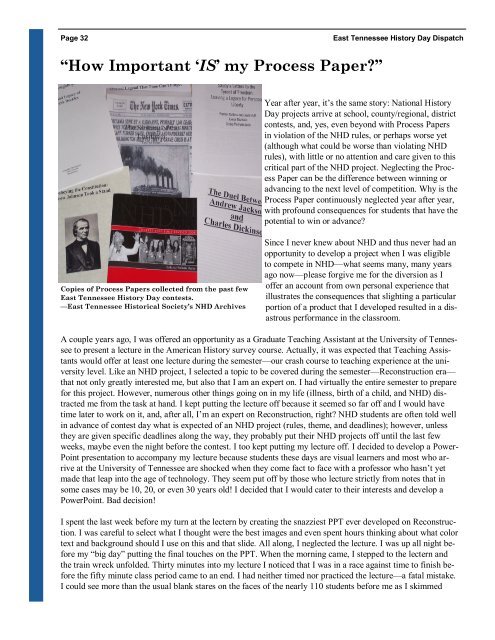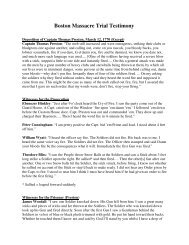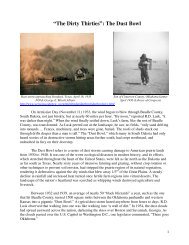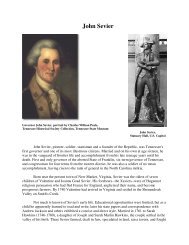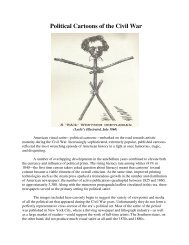Volume 1, Issue 1 - Teach American History
Volume 1, Issue 1 - Teach American History
Volume 1, Issue 1 - Teach American History
Create successful ePaper yourself
Turn your PDF publications into a flip-book with our unique Google optimized e-Paper software.
Page 32<br />
“How Important ‘IS’ my Process Paper?”<br />
Copies of Process Papers collected from the past few<br />
East Tennessee <strong>History</strong> Day contests.<br />
—East Tennessee Historical Society’s NHD Archives<br />
East Tennessee <strong>History</strong> Day Dispatch<br />
Year after year, it’s the same story: National <strong>History</strong><br />
Day projects arrive at school, county/regional, district<br />
contests, and, yes, even beyond with Process Papers<br />
in violation of the NHD rules, or perhaps worse yet<br />
(although what could be worse than violating NHD<br />
rules), with little or no attention and care given to this<br />
critical part of the NHD project. Neglecting the Process<br />
Paper can be the difference between winning or<br />
advancing to the next level of competition. Why is the<br />
Process Paper continuously neglected year after year,<br />
with profound consequences for students that have the<br />
potential to win or advance?<br />
Since I never knew about NHD and thus never had an<br />
opportunity to develop a project when I was eligible<br />
to compete in NHD—what seems many, many years<br />
ago now—please forgive me for the diversion as I<br />
offer an account from own personal experience that<br />
illustrates the consequences that slighting a particular<br />
portion of a product that I developed resulted in a disastrous<br />
performance in the classroom.<br />
A couple years ago, I was offered an opportunity as a Graduate <strong>Teach</strong>ing Assistant at the University of Tennessee<br />
to present a lecture in the <strong>American</strong> <strong>History</strong> survey course. Actually, it was expected that <strong>Teach</strong>ing Assistants<br />
would offer at least one lecture during the semester—our crash course to teaching experience at the university<br />
level. Like an NHD project, I selected a topic to be covered during the semester—Reconstruction era—<br />
that not only greatly interested me, but also that I am an expert on. I had virtually the entire semester to prepare<br />
for this project. However, numerous other things going on in my life (illness, birth of a child, and NHD) distracted<br />
me from the task at hand. I kept putting the lecture off because it seemed so far off and I would have<br />
time later to work on it, and, after all, I’m an expert on Reconstruction, right? NHD students are often told well<br />
in advance of contest day what is expected of an NHD project (rules, theme, and deadlines); however, unless<br />
they are given specific deadlines along the way, they probably put their NHD projects off until the last few<br />
weeks, maybe even the night before the contest. I too kept putting my lecture off. I decided to develop a Power-<br />
Point presentation to accompany my lecture because students these days are visual learners and most who arrive<br />
at the University of Tennessee are shocked when they come fact to face with a professor who hasn’t yet<br />
made that leap into the age of technology. They seem put off by those who lecture strictly from notes that in<br />
some cases may be 10, 20, or even 30 years old! I decided that I would cater to their interests and develop a<br />
PowerPoint. Bad decision!<br />
I spent the last week before my turn at the lectern by creating the snazziest PPT ever developed on Reconstruction.<br />
I was careful to select what I thought were the best images and even spent hours thinking about what color<br />
text and background should I use on this and that slide. All along, I neglected the lecture. I was up all night before<br />
my “big day” putting the final touches on the PPT. When the morning came, I stepped to the lectern and<br />
the train wreck unfolded. Thirty minutes into my lecture I noticed that I was in a race against time to finish before<br />
the fifty minute class period came to an end. I had neither timed nor practiced the lecture—a fatal mistake.<br />
I could see more than the usual blank stares on the faces of the nearly 110 students before me as I skimmed


